Judas: A Famous Traitor Or A Hero?
A. Sutherland - AncientPages.com - Judas remains a controversial figure in Christian history, despite his notorious role in the Gospel narratives.
According to Matthew 26:15, Judas agrees to betray Jesus.
"Then one of the twelve, called Judas Iscariot, went to the chief priests and said, “What are you willing to give me if I deliver Him to you?” And they counted out to him thirty pieces of silver. So from that time he sought opportunity to betray Him…”
The Arrest of Christ (Kiss of Judas), Giotto di Bondone, 1304–1306. Fresco, Scrovegni Chapel, Padua, Italy.
And so Judas betrayed his master to the authorities. This act led to the crucifixion and death of Jesus.
Was Judas the most famous traitor of all time who gave Jesus for 30 pieces of silver or was he a hero? Or perhaps it was not all about money?
Judas Iscariot was a treasurer of the apostles and was able to count well. If he was guided solely by desire for profit, he would probably have paid more. He would not return the money back to the high priests as soon as he was informed that Jesus was going to be condemned to death.
Then we have to ask ourselves: why did he shout returning money to the high priests:
"I have sinned by giving innocent blood." It sounded as though he confessed that he had earlier blamed Jesus and when he understood his own evil doing, he was still not asking for forgiveness for his betrayal. Instead he committed suicide, an act that made it impossible to be forgiven.
Why Did Judas Betray Jesus?
For two thousand years, many people have pondered this troublesome question. One of the widely prevailed opinions is that he did it of greed. According to the Gospels (of Matthew and Mark) wrote many years later, Judas took the money and sought the opportunity to spend it. According to Luke, on the other hand, Satan played a role and before the Easter Vigil (also called the Paschal Vigil) "entered Judas Iscariot."
In Luke 22:3 is said: "And Satan entered into Judas, who was surnamed Iscariot, one of the twelve."
And also in Luke 22:3-6 “And Satan entered into Judas, who was surnamed Iscariot, one of the twelve. And he went and discoursed with the chief priests and the magistrates, how he might betray him to them. And they were glad and covenanted to give him money. And he promised. And he sought opportunity to betray him in the absence of the multitude…”
The Gospel of St. John, was written a few decades later; it stated "he [Judas] was a thief and with a purse he stole what was being made." Judas carried the disciples' money bag or box but the Gospel does not mention the thirty pieces of silver as a fee for betrayal.
First page of the Gospel of Judas - Page 33 of Codex Tchacos. Image credit: Wikipedia
Why did Jesus entrust to Judas the supervision of the common cash if he had Matthew, a former tax collector, who could take this job?
From time to time, hypotheses appear that there is a great mystery behind Judas' deed.
The Gospel of John, 12:5-6 states that Judas spoke fine words about giving money (“worth a year’s wages”) to the poor, but the reality was "not that he cared for the poor, but [that] he was a thief, and had the money box; and he used to take what was put in it."
And again, in John 13:27-30, when Judas left the gathering of Jesus and His disciples with betrayal in his mind, some [of the disciples] believed that Judas might have been leaving to buy supplies or he had a charitable task to fulfil.
Mysterious Gospel of Judas
It was 1978, when the Egyptian peasants found in caves near El Minya, Egypt, ancient papyrus cards in a leather cover, written in an unknown language. They knew that old things had their price so they were bought and sold several times and changed owners who had to pay more and more for them.
See also:
Biblical Mystery Of Urim And Thummim: God’s Puzzling Communication Devices
Enoch – The Initiator – Pre-Flood Messenger Of God
Finally, the manuscript was smuggled to Switzerland, where its authenticity was officially confirmed. The manuscript - called the Gospel of Judas – was written on 13 sheets of papyrus, in the Coptic language used by Egyptian Christians.
According to Christian Apologetics & Research Ministry, the Gospel of Judas was developed by a Gnostic sect in the second century AD and was originally written in Greek around 130-170. It was not authored by Judas himself. The oldest extant copy is a Coptic manuscript written in Sahidic (last phase of ancient Egyptian) in the 4th or 5th century.
It was created around 1700 years ago, and began with the words "The secret science that Jesus gave to Judas Iscariot three days before Passover."
During six years, scientists put together all the fragments (about 1000 of them) and translated the manuscript into English, French and German; however, they were unable to buy it because an astronomical sum of $ 3 million was clearly demanded for the treasure.
Finally, it was decided that the codex would ultimately be returned to Egypt and housed in the Coptic Museum in Cairo.
Judas the Disciple of Jesus | Biblical Illustration of Judas Iscariot Attempting to Return 30 Pieces. Image credit: Pinterest
Was Judas God's Chosen And Savior?
According to Gospel of Judas, Iscariot was not a traitor, but rather an instrument of God. If Jesus had to die on the cross to save people, then somebody had to give him to the executioner and this “somebody” was Judas, chosen to this mostly ungrateful task.
Jesus warns Judas that he will suffer for a very long time.
“You surpass them all," Jesus says. "But you must, Judas, sacrifice the body that covers me. You will be cursed for generations, but you will come to rule over them…”
- And then, Judas would join the great enlightenment of mankind (secret knowledge) and so Iscariot agreed. This secret knowledge is involved in one of many theories promoted by the ancient Gnostic sects. However, Judas had nothing to with them and was not the author of the Gospel of Judas devoted to him because he died long before it was written.
There have been many attempts to rehabilitate Judas and those who have waited for it – did it in vain.
Was Judas Chosen To Fulfil A Prophecy?
According to John, Jesus chose Judas as a disciple in order to fulfil a prophecy.
Psalm 41:9 says:
“While I was with them, I protected them in your name that you have given me. I guarded them, and not one of them was lost except the one destined to be lost, so that the scripture might be fulfilled…”
John 13:18 says: “I am not speaking of all of you; I know whom I have chosen. But it is to fulfil the scripture, 'The one who ate my bread has lifted his heel against me…'
People wonder: Does it explain Judas’ act or like all human beings, Judas had free will and could have chosen not betray his master?
Or perhaps was it all the will of God that Judas should be lost?
Judas’ true secret will never be known because he took it to the grave.
Written by – A. Sutherland AncientPages.com Staff Writer
Copyright © AncientPages.com All rights reserved. This material may not be published, broadcast, rewritten or redistributed in whole or part without the express written permission of AncientPages.com
Expand for references
More From Ancient Pages
-
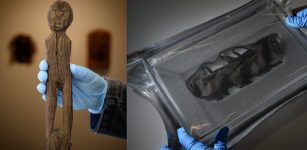 Ancient Artifacts Hidden Beneath The Ice In Danger As Glaciers Are Melting
Archaeology | Oct 19, 2020
Ancient Artifacts Hidden Beneath The Ice In Danger As Glaciers Are Melting
Archaeology | Oct 19, 2020 -
 Stunning Underwater Photos Reveal Secrets Of Legendary Lost City Of Heracleion
Featured Stories | May 4, 2013
Stunning Underwater Photos Reveal Secrets Of Legendary Lost City Of Heracleion
Featured Stories | May 4, 2013 -
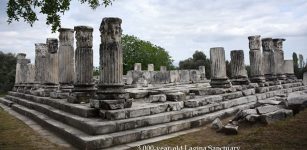 Lagina Sanctuary Of Goddess Hekate: Archaeologists Found Ceremonial ‘Sacred Road’
Archaeology | Jul 10, 2019
Lagina Sanctuary Of Goddess Hekate: Archaeologists Found Ceremonial ‘Sacred Road’
Archaeology | Jul 10, 2019 -
 Sacred Crystals Of The Cherokee – Myths, Traditions And History Explained
Featured Stories | Jun 3, 2019
Sacred Crystals Of The Cherokee – Myths, Traditions And History Explained
Featured Stories | Jun 3, 2019 -
 Skull From Broken Hill, Zambia Is Relatively Young – New Analysis Shows
Fossils | Apr 2, 2020
Skull From Broken Hill, Zambia Is Relatively Young – New Analysis Shows
Fossils | Apr 2, 2020 -
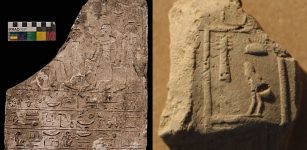 Important Discoveries Made In Upper Egypt’s Tel Edfu and Kom Ombo Sites
Archaeology | Jan 15, 2018
Important Discoveries Made In Upper Egypt’s Tel Edfu and Kom Ombo Sites
Archaeology | Jan 15, 2018 -
 Oldest Known Spearthrowers Found At 31,000-Year-Old Archaeological Site Of Maisières-Canal
Archaeology | Nov 6, 2023
Oldest Known Spearthrowers Found At 31,000-Year-Old Archaeological Site Of Maisières-Canal
Archaeology | Nov 6, 2023 -
 Never Before Seen 3D Images Of Noah’s Ark Finally Revealed To The Public
Archaeology | Nov 17, 2019
Never Before Seen 3D Images Of Noah’s Ark Finally Revealed To The Public
Archaeology | Nov 17, 2019 -
 Wasabi Plant Can Save Ancient Bio-Deteriorated Papyrus
Scripts, Paintings & Inscriptions | Apr 4, 2024
Wasabi Plant Can Save Ancient Bio-Deteriorated Papyrus
Scripts, Paintings & Inscriptions | Apr 4, 2024 -
 Long History Records Of Medicine In Mesopotamia And Sumer
Civilizations | Nov 20, 2017
Long History Records Of Medicine In Mesopotamia And Sumer
Civilizations | Nov 20, 2017 -
 51,000-Year-Old Bone Carving Shows Neanderthals Were Artistic Long Before Humans Arrived
Archaeology | Jul 6, 2021
51,000-Year-Old Bone Carving Shows Neanderthals Were Artistic Long Before Humans Arrived
Archaeology | Jul 6, 2021 -
 Cappadocia And Huge Unique Selime Cathedral
Featured Stories | Mar 19, 2019
Cappadocia And Huge Unique Selime Cathedral
Featured Stories | Mar 19, 2019 -
 Mysterious Old Ship With No Crew Reaches The Canadian Coast
Featured Stories | Jul 25, 2024
Mysterious Old Ship With No Crew Reaches The Canadian Coast
Featured Stories | Jul 25, 2024 -
 Ancient Marble Statue Of Sphinx Discovered In Tang Dynasty Tomb
Archaeology | Dec 16, 2015
Ancient Marble Statue Of Sphinx Discovered In Tang Dynasty Tomb
Archaeology | Dec 16, 2015 -
 Sacred Artifact With Mystical Powers – The Legend – Part 1
Ancient Mysteries | Apr 24, 2019
Sacred Artifact With Mystical Powers – The Legend – Part 1
Ancient Mysteries | Apr 24, 2019 -
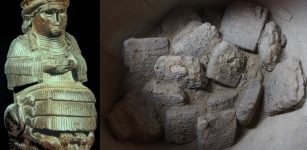 Sensational Find: Huge Cuneiform Archive Of Mysterious Ancient Clay Tablets Discovered In Iraq
Archaeology | Oct 26, 2017
Sensational Find: Huge Cuneiform Archive Of Mysterious Ancient Clay Tablets Discovered In Iraq
Archaeology | Oct 26, 2017 -
 How Henry VIII Accidentally Changed The Way We Write History
Featured Stories | Sep 6, 2024
How Henry VIII Accidentally Changed The Way We Write History
Featured Stories | Sep 6, 2024 -
 Excavations In Keezhadi, Tamil Nadu, India Shed Light On Life During Sangam Age
Artifacts | Aug 24, 2015
Excavations In Keezhadi, Tamil Nadu, India Shed Light On Life During Sangam Age
Artifacts | Aug 24, 2015 -
 Göbeklitepe-Like Kahin Tepe Is Oldest Worship Place In Black Sea Region – Interesting Finding
Archaeology | Sep 30, 2020
Göbeklitepe-Like Kahin Tepe Is Oldest Worship Place In Black Sea Region – Interesting Finding
Archaeology | Sep 30, 2020 -
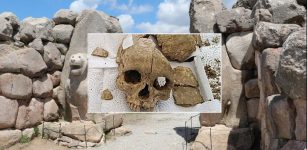 3,500-Year-Old Skull And Thighbone Discovered In Sapinuwa Antique City Of Central Anatolia
Archaeology | Dec 3, 2019
3,500-Year-Old Skull And Thighbone Discovered In Sapinuwa Antique City Of Central Anatolia
Archaeology | Dec 3, 2019



